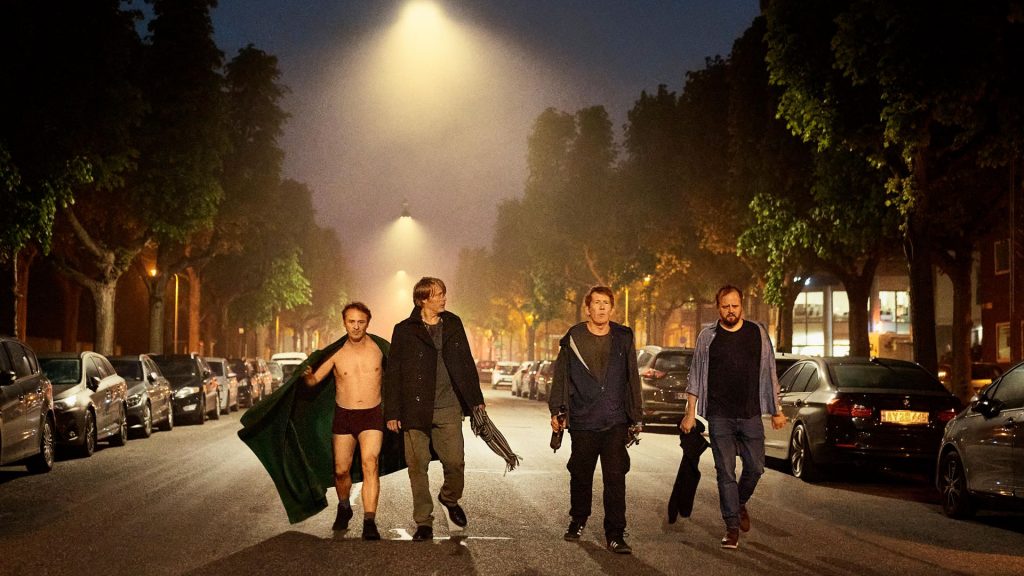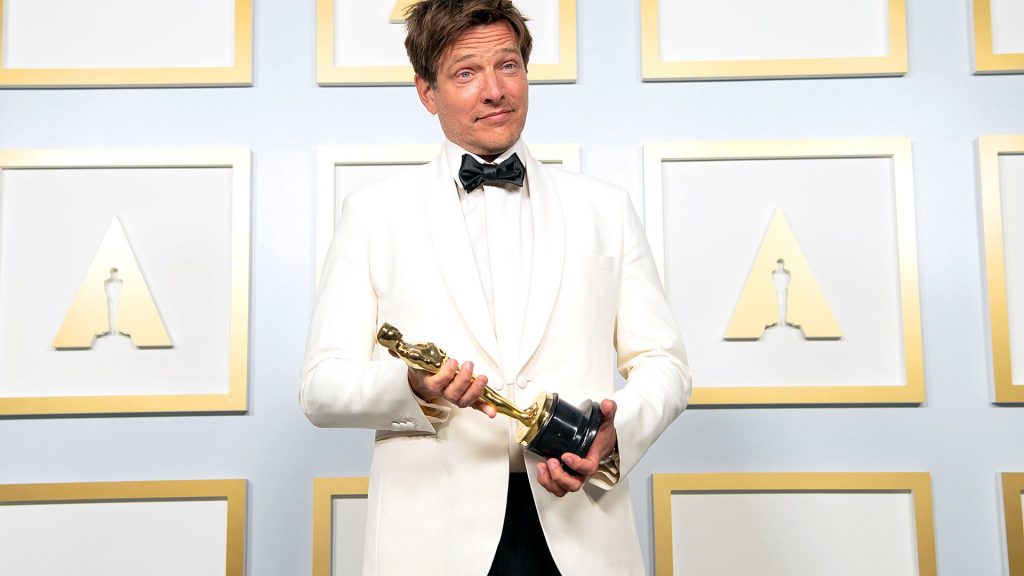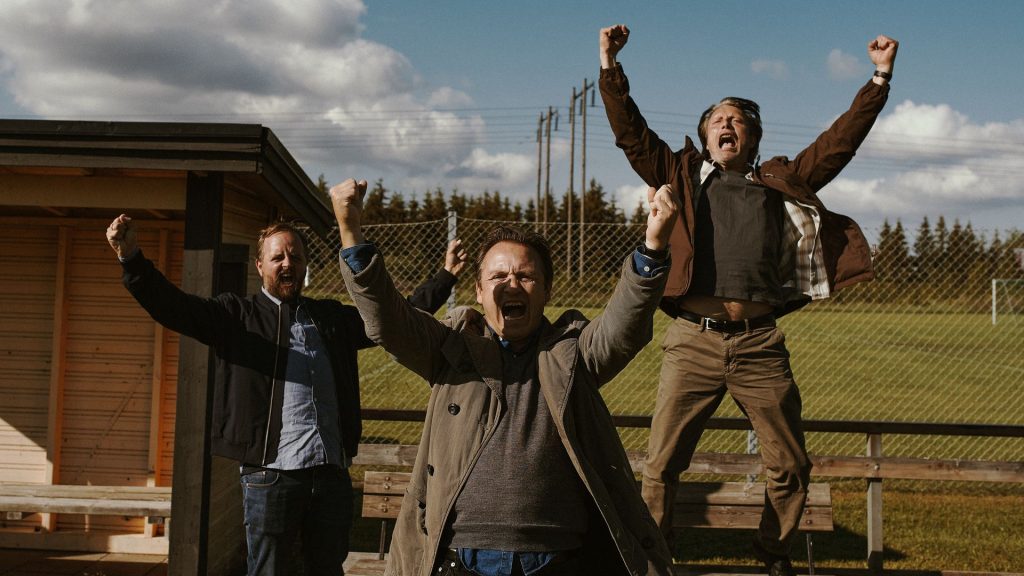
As soon as Denmark’s drinking comedy Another Round won the Oscar for Best International Film in Los Angeles in April, a Hollywood remake was announced. Leonardo DiCaprio and his production company had won the bidding auction and Leo had nabbed for himself Mads Mikkelsen’s plum role of Martin.
Hollywood always wants to remake successful European hits, as if clearing the subtitles off the screen will allow it a mainstream acceptance. Flush from selling his movie to the highest bidder, director and writer of Another Round Thomas Vinterberg is still all for it.
“Leonardo is a fabulous actor and I love his choices and what he saw for the movie,” he tells me. “I’m happy to leave it up to him and his people to do what they want to do with it. I’ll be around if they want advice but I don’t want too much involvement – you know, I made my film and I love it and I’m proud of it and don’t want to translate it. But of course, it’s going to be more about America and American culture and how it responds to the societal issues of my film and I think that will be fascinating to see.”

Vinterberg, 52, who won the BAFTA as well as the Oscar in an all-conquering year as his movie travelled the world during the lockdowns of the pandemic, has rich experience in this realm and let himself be guided by his gut in the negotiations by the fate of his most famous film Festen (Celebration), which shocked the world in 1998.
“It was translated into a stage play and was a bight in London,” he recalls. “And then it went into so many languages and I simply continue to be stunned by that fact and that success. But what I really love is seeing all these different cultures filter the drama of Festen through their own sensibilities. It has given so much joy. It’s like I have this son who travels the world and occasionally sends me a postcard to let me know where he is and how he’s doing. And sometimes he sends me a bit of money, too.”
Over the last 20 years, Vinterberg has become one of Europe’s most in-demand and recognised film-makers, although Another Round is his biggest hit in years. Co-writer of the original Dogme 95 manifesto which shook up independent cinema with its strict, radical rules for naturalism and stripped back film making aesthetic, he and his colleagues such as chief provocateur Lars von Trier, Susanne Bier, Paprika Steen and others certainly put Scandinavia on the map, resulting in it now being a powerhouse of distinctive film and TV production.
Although the gloomy Dogme look stopped after 35 official films, the influence is still keenly felt. “We were rebelling and we were told we were stupid and crazy and that it was career suicide,” recalls Vinterberg. “But the important thing is we did it all together and we all took the risk and we held hands and jumped off the cliff together, hoping there was water below.”
That sense of risk and solidarity is clearly very much behind the success of Another Round, on and off screen. Anyone who witnessed Vinterberg and his team accepting one of their numerous awards in recent months on Zoom will have seen the collective joy of them gathered in their Danish bubble. And Vinterberg’s films have that sensilbity too, come to think of it.
Festen, of course, features one of the great family dinner scenes; The Hunt, which also starred former Bond villain Mikkelsen, was about one man accused of a dreadful thing by his local community; and Another Round features four middle-aged high school teachers in a Copenhagen suburb,

who confront their boredom and comfort by experimenting with being a little bit drunk every day, all day.
“You know, I grew up in a commune so I’m used to sharing ideas and seeing what the collective does with them,” he reveals.”And when you’re in a commune, the centre stage is always a dinner table, and my life always had 13 huge individuals around it either in wild combat or wild party mode – everything happened around that table and it defined my upbringing and so I love tables with people talking – I love it in life or as scenes in a movie because in either case, it can explode in your face…”
Vinterberg made a dark comedy called Commune in 2013 exploring that side of a particularly Danish life. Copenhagen has Christiania, one of the most famous communes in the world, where 1000 or so inhabitants still live the hippie dream, although they do seem to spend most of their scowling at tourists.
“I think what it gave me was an occupation with the individual against the group and finding a life-giving energy in a true sense of solidarity,” reflects Vinterberg. “I’ve been pursuing that in life and work ever since and what I think people like about Another Round is that it is about a group who take a risk together, to do this crazy experiment that has both wonderful, liberating effects and then pretty dangerous and dark effects too.”
The teaching colleagues’ experiment is based on the theory of a Norwegian thinker and philosopher who posited that the human body would function better with 0.05% more alcohol in it, prompting the friends to try it. At first, the results are dramatic and fun, with pupils responding to their classes with tapped enthusiasm – Mikkelsen’s Martin is suddenly a riveting historian with tales of Churchill’s legendary inebriation; the sports teacher (Thomas Bo Larsen, superb) inspires the junior football team to unparalleled heights, the music teacher (Lars Ranthe) conducts the choir like never before.
Maintaining the microdosing (and the lie) becomes tough, especially when half-empty bottles are discovered in the gym cupboard and staff room. It’s a dangerous line they all tread and Martin’s home life begins to suffer, especially his passionless marriage to his beautiful wife Anika, played by the Swedish actress Marie Bonnevie.
“But that’s what I wanted,” pleads Vinterberg. “A bit of danger back in life. I know you can’t celebrate alcohol without being just provocative – there are too many hurt victims of alcoholism in families and individuals everywhere – but we live now in a society that is too controlled and nothing is left to chance. I want to rebel against that and say, when you bring a bottle to your lips, it’s like an agreement with yourself and the alcohol that the world is about to feel looser and that you’re letting go of control for a while.”

The film certainly shows drinking among the school students, to a degree some might find troubling. “Yes, we do have these rituals in my country and the kids, yes, they drink too much but most of them are so fed up with boozing by the time they leave school that they really don’t drink much into adulthood. But I have been feeling very sorry for that young generation who have been denied their natural instincts in lockdowns, their instinct to explore and see the world. I’m sad for them and I dedicate this film to them.
“And you know, drinking is not the problem – it is just the symptom of the real problem and that’s that their generation is historically unwell.”
As much as the film is about the four teachers, it is also about the pupils and their desires and anxieties, their need for inspirational teachers and for guidance. Vinterberg has felt this as a parent himself and says he wrote the film after talking to his daughter and her friends. “They feel controlled by what has become a performance culture,” he says.
Explaining further, he believes the youth are now trapped by the pressures of social media and economy. “They feel constantly evaluated, by likes, clicks and grades and they’ve become anxious and hyper self-aware and they’re trapped. We all are – even our phone tells us if we’ve done enough steps or [addressing me] your editor will see this article doesn’t have enough clicks and say well we won’t cover Danish cinema again. Now this is too judgemental and too pressured and there’s no room to take risks and fall on your face – I believe it’s all this that is leading to alcohol abuse and this is the problem we have to look at, not the drinking.”
He is clearly passionate about and informed and the response to his film has affected him deeply. Again, if you saw any of his acceptance speeches, they were among the most moving moments of all the ceremonies as he dedicated his wins to his daughter, Ida. Having been instrumental in the research of the film, she was even cast in a small role as Martin’s daughter. Just four days into the film’s shoot, Ida died in a car crash, aged 19.
“She loved this script and she was proud to represent her generation,” says Vinterberg. He’s spoken about her too many times and faced too many questions about it but it doesn’t make it any easier to talk about. Yes, the awards are a great testament to her but, to be blunt, they don’t bring her back and for all the talk of catharsis in making the film, I get the feeling that every screening of it, every award, every speech, every interview forces him to confront Ida’s death again.
“Nothing made sense,” he says. “That’s why I relied on my family and my team and crew and friends on this one, to pull through and make the movie for Ida and that’s why, for me, it’s very much a film about young people and how they should hold on to personality and to hope.”
Copenhagen is a bit of star in the film. This isn’t your typically dark look at Scandinavia. There’s a lot of daylight and outdoor living, shots of lakes and parks and smart restaurants and some fine dining.
“It’s an ode to my country for sure, probably the most Danish film I’ve ever made,” he says. “I go deep into its rituals and culture, the national songs and some customs that maybe I treat with some irony but also with a lot of fondness and love. I’m very proud of Copehagen and Danish film -you know, it’s not all about isolated modest lives in the dark north and I wanted to get out in the streets, get a bit of a southern European vibe, a sense of life.”
Inevitably, however, even above the picturesque city and its neatly designed interiors and views, it’s top Scandinavian star Mikkelsen who does steal it, particularly in the closing stages with a wild dance routine in the middle of Copenhagen’s famous waterfront area. The music of that moment, What A Life, has become a big hit around Europe for the Danish group Scarlett Pleasure, a sort of anthem for youth, and the accompaniment to many memes and TikToks of young people working on their Mads moves.
“Working with Mads is like working with Messi,” says Vinterberg. “He’s been my friend for many years but he’s also a brilliant actor and a very generous man who makes everyone around him better. You know, he didn’t want to do the dance at all because he thought it would be about him, Mads, and not about his character Martin and it would steal the movie. He’s a trained dancer but he didn’t want to show off so it was crucial to make the dance in a way the story of the whole film, about someone inhibited and then gradually finding some freedom.”
I wonder if Leonardo DiCaprio will put the dance into his version? “Well he’s a good mover for sure, if you remember Wolf of Wall Street, a very physical performance, but we will see. We don’t know what the message of the remake will be.” What does he hope for? It can’t possibly be as personal a project for whoever takes it on next.
“I think there are many ways to get inspired, that’s what I’m saying and that’s what I feel audiences are getting from the film as it travels around while people have been confined and locked down. Being drunk is one of those ways, but life can make you drunk if you’re good enough at living it. For me, it’s a movie about living and not just existing.”
Has anyone, I ask, taken the film to heart and begun to live by its theory of micro-dosing drunkenness? After all, I thought we were in an era of abstemiousness, of non-alcoholic beverages and temperance.
“I don’t mind if people do start drinking after the movie – who am I to tell anyone what to drink or how to drink or how much to drink?” comes Vinterberg’s smirking reply. “I personally haven’t tried to live my life with more alcohol in my bloodstream everyday. I have celebrated at the Oscars and our BAFTAs and have gone a bit berserk with the team on occasion, but none of us has taken this further.”
He pauses for reflection. “However, I am told some people in the office of my distributor in Paris have tried it, for research, you know. I’m not sure how it went. Funnily enough, we haven’t had the results back yet…”
SIX GREAT FILMS ABOUT DRINKING
Sideways (2004) Director Alexander Payne adapts Rex Pickett’s novel of male mid-life crisis into a bittersweet modern classic of wine and friendship. Paul Giamatti’s struggling writer Miles takes Thomas Haden Church’s out-of-work actor Jack for a week in California’s Santa Ynez wine country to celebrate the latter’s upcoming wedding. Days of tastings melt into nights of recriminations, awkward sex and tirades about Merlot.
The Lost Weekend (1945) A Hollywood classic that won both the Oscar and the Palme d’Or, Billy Wilder’s film follows Ray Milland and Jane Wyman through a desperate few days in New York as an author resolves to make his struggles with drink, lies, pawn shops, his girlfriend and suicide the subject of his book.
Husbands (1970) Vinterberg admits this John Cassavetes cult indie drama was a model for Another Round, the improvised, slurring story of three Long Island pals thrown into mid-life crisis by the sudden death of another mate. After the funeral, Peter Falk, Ben Gazzara and Cassavetes himself embark on a binge of booze, gambling and girls that somehow evolves into a rain-sodden visit London.
The Girl on the Train (2016) Adapted from Paula Hawkins’ novel and transposed from London to suburban New York, this melodramatic film, with shades of Gaslight, casts Emily Blunt as a drinker reeling from her own failed marriage by fixating on the goings-on of a couple in a house she sees from the train window on her daily commute into Grand Central Station. In the book, it’s pre-mixed cans of G&T; in the movie, it’s vodka secreted in a water bottle. Blunt’s drunk acting is impressive.
L’Assommoir (1909) Based on Zola’s novel (often translated as The Drinking Den but, more literally, “a place to get smashed”) this, at 35 minutes, is widely credited as cinema’s first feature film. Like Manet and Degas’ portraits of absinthe drinkers, it’s about the perils of drink among the Paris working class, featuring warring women, jealous lovers and a lethal drinking game. It was remade several times, most famously as Rene Clement’s 1956 Oscar-nominated Gervaise, starring Maria Schell.
Drunken Angel (1948) Mifune was the title of the third Dogme movie, named after the famous Japanese actor Toshiro Mifune…whose first of 16 collaborations with director Akira Kurosawa came in this stylish, influential Tokyo noir. Mifune plays a wounded yakuza gangster drinking himself to death until he’s cared for by an alcoholic doctor (another Kurosawa regular, Takashi Shimura) seen by the criminal underworld as the “drunken angel”, saviour of alcoholics.
What do you think? Have your say on this and more by emailing letters@theneweuropean.co.uk










